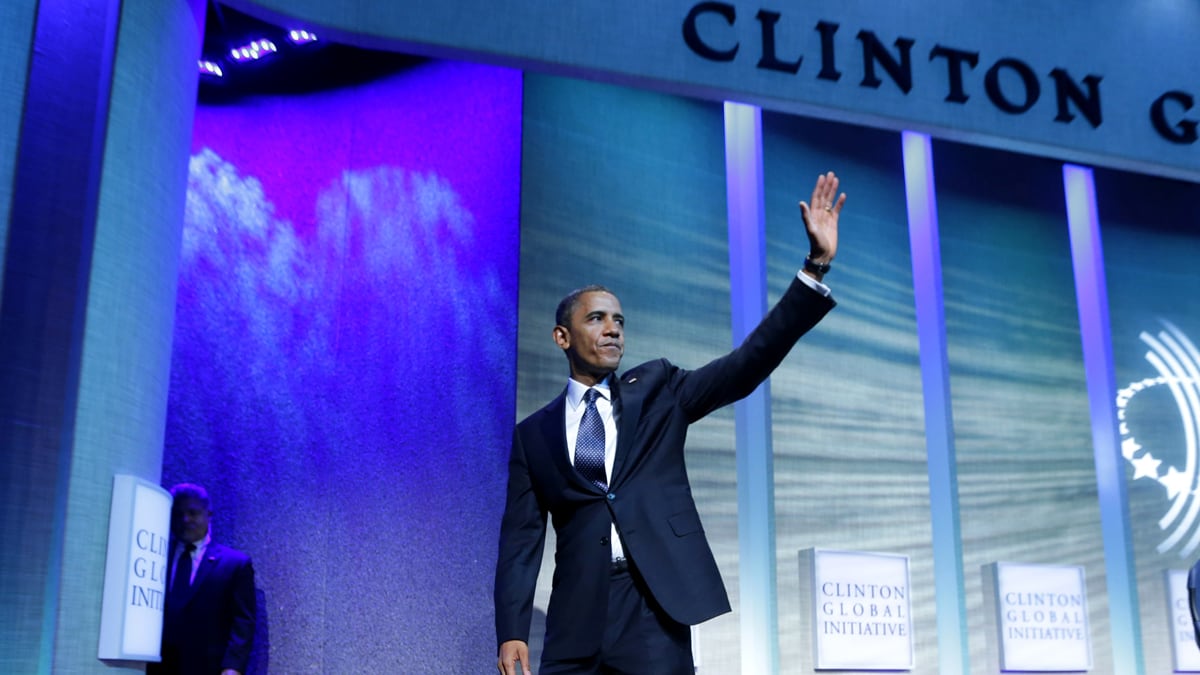The frenetic campaign for the presidency took a brief pause Tuesday morning when both candidates stopped by the Clinton Global Initiative summit in New York City. Early in the morning, GOP nominee Mitt Romney spoke about the importance of the free enterprise system and the dignity of work, but did not explicitly mention his own candidacy or the name of his opponent.
Less than three hours later, the unnamed opponent showed up, fresh from his address to the United Nations General Assembly, and continued with the generally apolitical theme, sticking to advocacy topics that few would find objectionable.
Taking as his text the Emancipation Proclamation, President Obama devoted his brief remarks to the “outrage” of human trafficking around the world.
“I’m talking about the injustice, the outrage of human trafficking, which must be called by its true name: modern slavery,” Obama said. He denounced the phenomenon of women employed as prostitutes against their will, boys kidnapped to become soldiers, and workers held captive as domestic servants. “It is barbaric and it is evil, and it has no place in a civilized world,” he said.
“New anti-trafficking teams are dismantling their networks,” Obama said of domestic efforts to crack down on those who buy and sell people. “We’re putting them where they belong—behind bars.”
Evoking the stories of two women who were both victims of human trafficking, one from the DR Congo and one from Indonesia, Obama said that the international community had to do more to prevent others from falling into the net of traffickers.

The President also stressed the importance of childhood education in the developing world, especially for young women. “By every benchmark, nations the educate their women and girls end up being more successful,” Obama said.
While former President Bill Clinton’s annual big-ideas summit is officially and carefully nonpartisan, it was clear that Obama had home-field advantage. Upon taking the stage the President received a warm ovation.
In introducing Obama, Clinton said he was going to “violate all protocol” by giving his own, characteristically Clintonian, remarks. “I’m going to finish that speech I started in Charlotte,” Clinton remarked, going on to say that Obama “started his life as an NGO,” and selected “a Secretary of State who was a walking NGO.”
Obama responded by noting that somebody had responded to Clinton’s convention speech by suggesting that the former president be named the Secretary of Explaining Stuff. (Mitt Romney was also quick to acknowledge the benefits of being introduced by Clinton.)
Obama’s speech had little to do with domestic politics, but in giving it the President took advantage of one of the factors that has been helping him significantly this year in the campaign—the power of incumbency. It wasn’t just that he was introduced as the 44th President. Rather, Obama was able to talk about a significant problem in the world, and then propose and promise that his administration would take action on it immediately. In contrast, Romney was limited to saying he hoped to return to the summit in 2013 as President.
Obama spoke of strengthening training of law enforcement so investigators can recognize and help victims of human trafficking more effectively. “We’re going to work with Amtrak and bus inspectors, and better serve those who are vulnerable,” he said, adding that the White House’s office of faith-based partnerships will be working on the topic this year.
And he promulgated a new policy via executive order. “As one of the largest purchasers of goods and services in the world, the United States will lead by example,” he said in reference to the order, which amends regulations to “prohibit contractors and subcontractors from engaging in specific trafficking-related activities,” and adds new compliance plans for contracts that are carried out overseas.
“We’re making clear that American tax dollars will have zero tolerance for trafficking of human beings,” Obama said.
Unlike Mitt Romney, who spoke at length on the recent troubles in the Middle East, Obama steered clear of the topic, although in his UN speech he mounted a vigorous defense of freedom of speech and offered a heartfelt tribute to slain U.S. Ambassador to Libya Chris Stevens.
Overall, Obama’s rhetoric was anodyne and non-objectionable, and the new, small-bore measures he offered don’t significantly alter federal policy. But when addressing a gathering that has already sat through two days of high-flown, ennobling, non-objectionable rhetoric, most recently from your opponent, it’s nice to have some Presidential arrows in your quiver.






